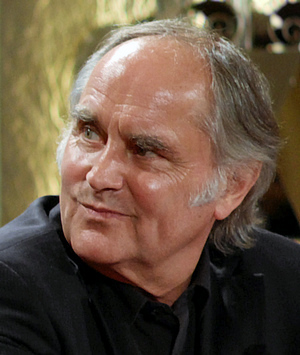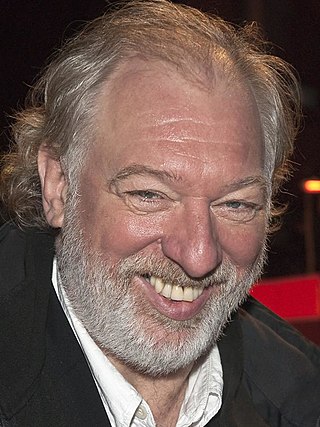Related Research Articles

John Richard Schlesinger was an English film and stage director, and actor. He emerged in the early 1960s as a leading light of the British New Wave, before embarking on a successful career in Hollywood, often directing films dealing frankly in provocative subject matter, combined with his status as one of the only openly-gay directors working in mainstream films.
John Philip Madden is an English director of stage, film, television, and radio. He is known for directing Shakespeare in Love (1998), which won the Academy Award for Best Picture. He has also gained recognition for directing The Best Exotic Marigold Hotel (2012) and its sequel The Second Best Exotic Marigold Hotel (2015).

Armin Mueller-Stahl is a retired German film actor, painter and author, who also appeared in numerous English-language films since the 1980s. He was nominated for the Academy Award for Best Supporting Actor for his role in Shine. In 2011, he was awarded the Honorary Golden Bear.
Athol Fugard OIS HonFRSL is a South African playwright, novelist, actor, and director widely regarded as South Africa's greatest playwright. He is best known for his political and penetrating plays opposing the system of apartheid. Some of these have also been adapted for film.

Michael Verhoeven is a German film director.

Billie Honor Whitelaw was an English actress. She worked in close collaboration with Irish playwright Samuel Beckett for 25 years and was regarded as one of the foremost interpreters of his works. She was also known for her portrayal of Mrs. Baylock, the demonic nanny in the 1976 horror film The Omen.
Walon Green is an American documentary film director and screenwriter, for both television and film.

Wolfgang Becker is a German film director and screenwriter, best known to international audiences for his work Good Bye Lenin! (2003).

Justin Chadwick is an English actor and television and film director. He directed episodes of EastEnders, Byker Grove, The Bill, Spooks and Red Cap before directing nine of the fifteen episodes of the mini-series Bleak House, which was broadcast by the BBC in the UK and by PBS in the United States as part of its Masterpiece Theatre series.
Boesman and Lena is a small-cast play by South African playwright Athol Fugard, set in the Swartkops mudflats outside of Port Elizabeth in the Eastern Cape. It features a "Coloured" man and woman walking from one shanty town to another, and explores the effect of apartheid on a few individuals.
Marigolds in August is a play by South Africa's Athol Fugard.
Georgi Djulgerov is a Bulgarian film director, screenwriter, producer and professor at the National Academy for Theatre and Film Arts.
Marigolds in August is a 1980 South African drama film directed by Ross Devenish, based on the play of the same name by Athol Fugard. It was entered into the 30th Berlin International Film Festival, where it won the Berlin Bear Anniversary Prize.
Igor "Izi" Ivanov is a Macedonian film director and writer. He studied philosophy and began his film career in 1993, when he started directing series of films for television. Between 1995 and 2004 he made several documentaries and short films; one of them, the 15-minute-long Bugs, competed at the 54th Berlinale and won Golden Leopard at the Locarno festival.

Jacob Berger is a Swiss film director, screenwriter, and actor. His 1991 film Angels was entered into the 40th Berlin International Film Festival.; his second motion picture A Loving Father (2002), reunited Gérard Depardieu and his son Guillaume Depardieu; That Day won Best Director at the 2007 Montreal World Film Festival and "A Jew Must Die", his 2017 motion picture earned Bruno Ganz a Swiss Film Award for best actor.

Denis Côté is an independent filmmaker and producer living in Quebec, of Brayon origin. His experimental films have been shown at major film festivals around the world.
Thomas Imbach is an independent filmmaker based in Zürich, Switzerland. With his production company Bachim Films, Imbach produced his own work until 2007. He then founded Okofilm Productions together with director/producer Andrea Staka. All of his films have been released theatrically and Imbach has won numerous awards for his work, both in Switzerland and abroad. With Well Done (1994) and Ghetto (1997) Imbach established his trademark audio-visual style, which is based on a combination of cinema- verité camera-work and fast-paced editing. His fiction features Happiness is a Warm Gun, as well as Lenz (2006), I Was a Swiss Banker (2007) and the fictive autobiography Day is Done (2011) all premiered at the Berlinale. His latest feature film Mary Queen of Scots celebrated its premiere in Locarno and at the Toronto International Film Festival in 2013. His latest documentary Nemesis celebrated its international premiere at International Documentary Film Festival Amsterdam 2020, where it received the Prize for Best Cinematography. Thomas Imbach is currently considered one of the most unconventional and consistent Swiss filmmakers.
Michael Carson Lennox is a Northern Irish film director.

Edward Berger is a German-Austrian and Swiss director and screenwriter. He notably directed German films Jack (2014), All My Loving (2019), and All Quiet on the Western Front (2022). For the latter, Berger received numerous accolades including the Academy Award for Best International Feature Film and three BAFTA Awards for Best Film Not in the English Language, Best Direction and Best Adapted Screenplay.
Florian Hoffmeister, B.S.C., is a German cinematographer and director, best known for his work on Tár, which earned him an Academy Award nomination for Best Cinematography. Projects he has worked on include Five Days, House of Saddam and AMC's The Terror. He has collaborated with director Terence Davies on two occasions, working on The Deep Blue Sea and A Quiet Passion. His other credits include In Secret, Mortdecai and Johnny English Strikes Again.
References
- ↑ "Berlinale 1980: Prize Winners". berlinale.de. Retrieved 21 August 2010.